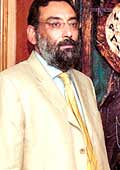|
 ...Hello,
soccer. But is it a case of sour grapes or an ominous comment
on cricket's waning appeal? Whatever it is, Subhash Chandra
of Zee Telefilms has decided that cricket isn't worth the
trouble. Not surprising at all. Although Chandra, 54, put in the
highest bid last year to win rights to cricket telecast, the Board
of Control for Cricket in India (BCCI) rejected the bid on technical
grounds. A legal battle ensued that's now in the courts. With
his relations with BCCI straining at the leash, Chandra has decided
to turn to soccer. Recently, his Zee Sports signed a deal with
the All India Football Federation for rights to telecast soccer
matches for the next 10 years. Said to be worth Rs 30 crore, according
to sources close to Zee, the deal entails not just telecasting
but promoting domestic tournaments such as the Federation Cup,
Santosh Trophy and the National Football League. With Indian cricketers
doing a perfect job of turning viewers away from cricket, Chandra
may actually be onto something big here. ...Hello,
soccer. But is it a case of sour grapes or an ominous comment
on cricket's waning appeal? Whatever it is, Subhash Chandra
of Zee Telefilms has decided that cricket isn't worth the
trouble. Not surprising at all. Although Chandra, 54, put in the
highest bid last year to win rights to cricket telecast, the Board
of Control for Cricket in India (BCCI) rejected the bid on technical
grounds. A legal battle ensued that's now in the courts. With
his relations with BCCI straining at the leash, Chandra has decided
to turn to soccer. Recently, his Zee Sports signed a deal with
the All India Football Federation for rights to telecast soccer
matches for the next 10 years. Said to be worth Rs 30 crore, according
to sources close to Zee, the deal entails not just telecasting
but promoting domestic tournaments such as the Federation Cup,
Santosh Trophy and the National Football League. With Indian cricketers
doing a perfect job of turning viewers away from cricket, Chandra
may actually be onto something big here.
 Odd
Man Out Odd
Man Out
In
an industry that thrives on shunning risk, Gary Bennett comes
across as an oddball. He barely passed his high school, was a
father at 17 and sold insurance policies as his first job. Apparently,
he proved so good at it that 34 years on, he's landed in India
as Max New York Life's new CEO. "It was providential, a lifetime
opportunity to work in an exciting market," says the cricket-
and curry-loving Aussie, who boasts a wine collection comprising
14,000 bottles. Needless to say, his "nest egg" is insured.
In Good Company
 Nandan
Nilekani may have never studied economics, but that doesn't
mean he can't teach the world a thing or two about capitalism.
That's not us saying, but the Austrian government, which last
fortnight honoured the Infosys CEO with the Joseph Schumpeter
award in recognition of his innovative services in economy, politics
and economic sciences. Says Nilekani, 49: "It's a great honour
to be recognised. It's a recognition of what Infosys stands for."
With the award, Nilekani, the first Indian to be so honoured,
joins an exclusive winners' club that includes, among others,
Helmut Kohl, Ted Turner, Jorma Ollila and Romano Prodi. Nandan
Nilekani may have never studied economics, but that doesn't
mean he can't teach the world a thing or two about capitalism.
That's not us saying, but the Austrian government, which last
fortnight honoured the Infosys CEO with the Joseph Schumpeter
award in recognition of his innovative services in economy, politics
and economic sciences. Says Nilekani, 49: "It's a great honour
to be recognised. It's a recognition of what Infosys stands for."
With the award, Nilekani, the first Indian to be so honoured,
joins an exclusive winners' club that includes, among others,
Helmut Kohl, Ted Turner, Jorma Ollila and Romano Prodi.
 Boutique
Bug Boutique
Bug
Her
lawyer husband (N.G. Khaitan of Khaitan & Co.) may be busy spearheading
a legal battle against R.S. Lodha on behalf of the Birlas, but
Madhu Khaitan has chosen to do far prettier things-like
promoting ethnic wear in European colours. The 46-year-old recently
opened a plush boutique at 3 Queens Park in Kolkata to offer everything
from sequins to swirling lehengas to accessories like bags and
costume jewellery. The avant-garde fashion designer, whose firm
Malika Incorporated already exports Rs 4-crore worth of ethnic
wear, says this is just the beginning. She's gearing up to open
her first outlet in Italy sometime in the next six months, followed
by a chain of stores across India. "It's creativity that drives
me," she says. It doesn't hurt that it makes business sense too.
Mad Bull?
 Admittedly,
these are irrational times on d-street. Even so, Milind Karandikar's
predictions must turn even the most bullish investor on the Indian
stock markets pink with embarrassment. For, even as SEBI cries
penny-stock scam, Karandikar, 43, is predicting that the Sensex
will scale the 18,000-mark by 2010. What's interesting is that
Karandikar, an IIT Bombay grad, isn't your typical Dalal Street
investor, but a hobby technical analyst, whose day job is to teach
class 12 students mathematics at the institute he set up eight
years ago after he quit his job at Hoechst. "Once the pattern
of movement in the Sensex is set, it will continue and stop only
after reaching the set target, with people trying to justify value
at higher levels," he says. Don't sneeze at Karandikar. He's said
to have predicted the Sensex's May 17 fall to the levels of 4,000
and its subsequent rise to 8,000. And on his latest prediction,
he's got both time and bulls on his side. Admittedly,
these are irrational times on d-street. Even so, Milind Karandikar's
predictions must turn even the most bullish investor on the Indian
stock markets pink with embarrassment. For, even as SEBI cries
penny-stock scam, Karandikar, 43, is predicting that the Sensex
will scale the 18,000-mark by 2010. What's interesting is that
Karandikar, an IIT Bombay grad, isn't your typical Dalal Street
investor, but a hobby technical analyst, whose day job is to teach
class 12 students mathematics at the institute he set up eight
years ago after he quit his job at Hoechst. "Once the pattern
of movement in the Sensex is set, it will continue and stop only
after reaching the set target, with people trying to justify value
at higher levels," he says. Don't sneeze at Karandikar. He's said
to have predicted the Sensex's May 17 fall to the levels of 4,000
and its subsequent rise to 8,000. And on his latest prediction,
he's got both time and bulls on his side.
 Business
On His Mind Business
On His Mind
Jammu
& Kashmir may still be a hotbed of separatist violence, but the
state's chief banker and Chairman of four months of J&K Bank,
Haseeb Drabu, 43, isn't letting any of that get in the
way of his business plans. An economist and a former editor at
Business Standard, Drabu plans to increase the number of bank
branches in the state to 500 from 320. "During the last few years,
while others shut down their branches, we expanded in the state,"
he says. He's even looking at specialised branches outside the
state (for leather companies in Chennai, spices in Kerala). Part
of it is inevitable. The J&K Bank already has an 80 per cent share
of banking in the state.
-Contributed by Krishna Gopalan,
Ashish Gupta, Venkatesha Babu, Ritwik Mukherjee,
Mahesh Nayak and Kumarkaushalam
|




 ...Hello,
soccer. But is it a case of sour grapes or an ominous comment
on cricket's waning appeal? Whatever it is, Subhash Chandra
of Zee Telefilms has decided that cricket isn't worth the
trouble. Not surprising at all. Although Chandra, 54, put in the
highest bid last year to win rights to cricket telecast, the Board
of Control for Cricket in India (BCCI) rejected the bid on technical
grounds. A legal battle ensued that's now in the courts. With
his relations with BCCI straining at the leash, Chandra has decided
to turn to soccer. Recently, his Zee Sports signed a deal with
the All India Football Federation for rights to telecast soccer
matches for the next 10 years. Said to be worth Rs 30 crore, according
to sources close to Zee, the deal entails not just telecasting
but promoting domestic tournaments such as the Federation Cup,
Santosh Trophy and the National Football League. With Indian cricketers
doing a perfect job of turning viewers away from cricket, Chandra
may actually be onto something big here.
...Hello,
soccer. But is it a case of sour grapes or an ominous comment
on cricket's waning appeal? Whatever it is, Subhash Chandra
of Zee Telefilms has decided that cricket isn't worth the
trouble. Not surprising at all. Although Chandra, 54, put in the
highest bid last year to win rights to cricket telecast, the Board
of Control for Cricket in India (BCCI) rejected the bid on technical
grounds. A legal battle ensued that's now in the courts. With
his relations with BCCI straining at the leash, Chandra has decided
to turn to soccer. Recently, his Zee Sports signed a deal with
the All India Football Federation for rights to telecast soccer
matches for the next 10 years. Said to be worth Rs 30 crore, according
to sources close to Zee, the deal entails not just telecasting
but promoting domestic tournaments such as the Federation Cup,
Santosh Trophy and the National Football League. With Indian cricketers
doing a perfect job of turning viewers away from cricket, Chandra
may actually be onto something big here. Odd
Man Out
Odd
Man Out N
N Boutique
Bug
Boutique
Bug A
A Business
On His Mind
Business
On His Mind